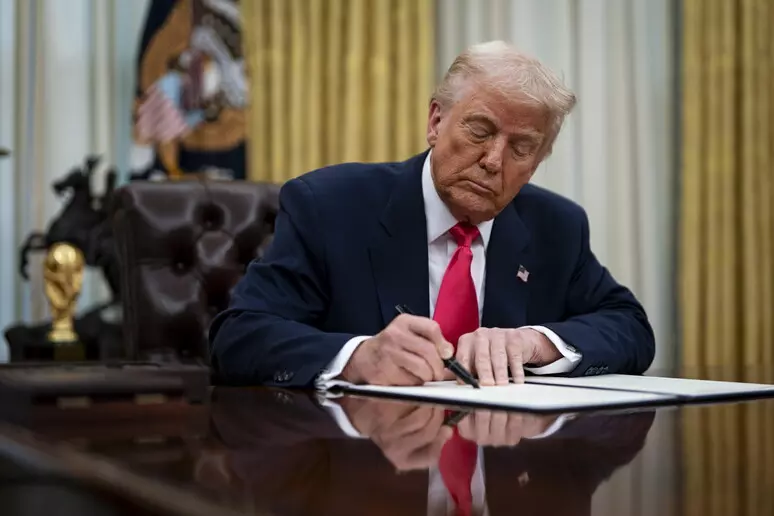On Wednesday afternoon at 4 p.m., Donald Trump will give all the details about the tariffs from the Rose Garden of the White House. Little is known so far, both about the countries that will be hit by the president’s thunderbolts and the goods that will be taxed.
According to Politico, Trump has been presented with several proposals by his economic advisers, and the president has reportedly chosen that of Commerce Secretary Howard Lutnick, the former CEO of Cantor and Fitzgerald. Given his long personal friendship with Trump, Lutnick reaches him directlyon his cell, avoiding all the filters imposed by Susie Weils, the White House Chief of Staff. Lutnick spent a lot of time with Trump preparing the plan, which was different from the one that had been proposed by Treasury Secretary Scott Bessent which has been shelved.
Despite all the smiles and forced optimism shown by White House spokeswoman Karoline Leavitt, there must be rough seas inside the building. Within 24 hours of the announcement, Leavitt said Trump was meeting with his economic advisers “to make sure this is a perfect deal for the American people and the American workers. You all will all find out in about 24 hours from now. Every country that has treated the United States unfairly will have to expect tariffs. The president is always up to take a phone call, always up for a good negotiation.” That is, an agreement that will inevitably disrupt the economies of a great many countries that were allies until yesterday, and that also puts the U.S. economy at risk would be a ploy to try to put those who trade with the United States on the spot and then deal in a position of strength. And like any experiment, the results are not entirely obvious. So much so that, according to Politico, that Treasury Secretary Bessent has reportedly begun to distance himself from the plan presented by Lutnick and reworked by Trump.
It was a plot extensively tested in episodes of The Apprentice, in which Trump left the participants of the TV show in the uncertainty of being fired, after threats were made out in the open, waiting for those who had been redacted to come backwith their tails between their legs so that he could dictate the terms of his employment. That bluff on television gave him that halo of the merciless entrepreneur, so beloved by the masses that brought him to the White House. It remains to be seen now whether this television staging also works with the rest of the world, the real world. For now Canada has answered him in spades and Mexico is smiling as it sees American companies that have built factories on Mexican soil being penalized. Surely the president is playing with fire because the only sin his constituents will not forgive him for will be that of putting a dent in their wallets.
Meanwhile, South Korea, China, and Japan held their first economic dialogue in six years a decade ago, seeking to facilitate regional trade in preparation for curbing U.S. tariffs.
The tariffs that the White House will announce tomorrow will affect “all countries,” not just those with the largest trade imbalances with the United States. Trump has already said this in recent days, rejecting the idea that tariffs will affect only a small number of Washington’s trading partners. “We will start with all countries and see what happens.”
After announcing the tariffs six weeks ago, Trump had appeared to soften his tone, explaining that he would give a “break to many countries” and that the tariffs would be “less harsh than reciprocal” to avoid inflicting heavy damage. On Friday, he then opened to the possibility of understandings with individual states. Over the weekend, however, he hardened. On NBC, he said he was not interested in a possible price increase for foreign imported cars, on which he has imposed a 25 percent duty that will take effect April 3, and was ready to deal only with countries willing to “offer something of value.” On Sunday, returning from Mar-a-Lago, he upped the ante by explaining that the duties would affect “all countries,” thus contradicting Bessent, who in previous days had spoken of duties only against the “dirty 15,” – the 15 countries with the largest trade imbalances with the United States.
Trump’s evolving positions are complicating the work of his staff, which is called upon to present the president with the strategy to follow. After focusing on reciprocal tariffs for more than a month, the administration is back to considering universal tariffs at 20 percent. But the White House will also have another hurdle to overcome: there are some Republican senators who have said they intend to join the Democrats in opposing the duty plan in general and in those imposed on Canada in particular.
Republican senators Susan Collins and Thom Tillis have said they intend to support Democratic Senator Tim Kaine’s resolution to block the 25 percent across-the-board tariffs. They will be joined by GOP Senator Rand Paul, a co-sponsor of Kaine’s resolution and a strong opponent of the duties. Ninety-one-year-old Iowa Senator Chuck Grassley, one of many Republicans from farm states who has raised strong concerns about tariffs in general, said he has not yet decided whether to oppose the president. Collins is concerned about potential disruptions to key economic engines in her home state of Maine, whose economy is closely integrated with Canada’s.
Should four Republican senators join all 47 Democrats in supporting Kaine’s resolution, it would be the first rejection in the Senate that has a Republican majority since Trump took office in January.












